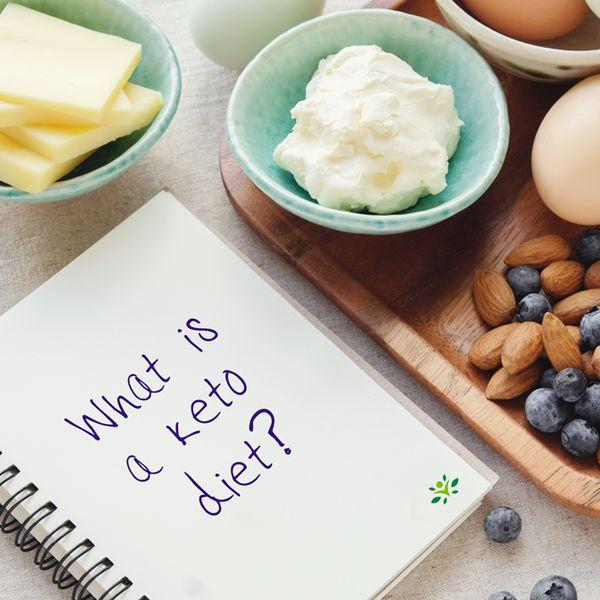What is a Keto Diet?
Celebrity endorsements have the internet buzzing about the keto diet. It's dominating newsfeeds and infiltrating inboxes everywhere. But what exactly is the keto diet craze? Should you consider trying it? And how does it work?
This diet isn't suitable for everyone. The keto diet is an extremely low-carb, high-fat diet that essentially tricks your body into thinking it's fasting. The goal of this method, like many other weight-loss diets, is to get your body to burn stored fat.
Ketogenic diets require a complete overhaul of your diet, and not always for the better. Before starting a keto diet, you should consult with your dietitian or doctor to determine if it's right for you and your lifestyle. However, we want to illuminate how this diet functions and what it entails, helping you better understand the ketogenic diet trend sweeping the web.
Keto Diet History
The keto diet traces back to the 1920s when researchers sought a therapeutic alternative for patients needing some benefits of fasting to address specific health concerns.1 Since maintaining a fast can be challenging, the researchers devised a method to mimic a fasting metabolic state.
For those initial researchers, weight loss was more of a side effect than a primary goal. The keto diet remained largely within the medical realm with high success rates until it received celebrity attention in the 90s.
Since then, several ketogenic-related diets have emerged, including the MCT diet and the Atkins diet. However, the keto diet has consistently remained in the spotlight, particularly as certain celebrities have adopted it.
How Does the Keto Diet Work and What is Ketosis?
To understand how the keto diet functions, you must understand ketosis. Ketosis is a physiological state that occurs when carbohydrate intakes are significantly reduced.2 When your body is in ketosis, it burns fat for fuel, both from the foods you consume and from your body's fat stores. You naturally enter ketosis when you fast or after physical activity has depleted your glycogen stores.3
But what exactly is glycogen? Glycogen is derived from carbs. When you consume carbs, like grains and sugars, they are broken down into glucose, which your body then converts into glycogen for a quick energy source.3 By severely limiting carbohydrates, your body lacks access to glycogen. This triggers your liver to produce ketones for energy instead. Ketones are water-soluble molecules produced by breaking down fatty acids. Your body generates and uses ketones for fuel in the absence of glycogen.
When overall food intake is low, such as during a fast, this natural process causes your body to utilize fat stores. This capability allows humans to survive without food for periods. During a fasted state, your body releases stored fat from fat cells, which your liver converts into ketones to fuel your body. Since a reduction in glycogen essentially triggers this process, you can induce ketosis by altering your diet.
Stages of Ketosis
The objective of a keto diet is to maintain a ketogenic state as consistently as possible, but it doesn't occur immediately. It takes time for your body to adjust and begin producing ketones. The duration depends on your body, activity level, and dietary intake. It may take a few days or up to a week. Individual experiences vary.
How can you tell if you're in a ketogenic state? Keto test strips, available at most pharmacies, measure ketones in urine. More comprehensive tests, including breath tests and blood ketone meters, are also available, but keto test strips are a good starting point.
Potential Benefits of the Ketogenic Diet
Many people turn to a keto diet primarily for fat loss. Numerous individuals, including celebrities, have lost significant weight on a keto diet.4 However, it's not entirely healthy. Eliminating an entire food category also removes essential nutrients. Here are some potential benefits that dieters seek from a keto diet.
Less Hunger?
You may feel less hungry on a keto diet than on some other restrictive diets because fats and proteins are quite satiating. You can also consume filling, fiber-rich greens.
Reduced Temptation to Cheat?
This is another potential advantage of a diet focused on satiating foods—you may be less inclined to cheat. Additionally, the keto diet isn't as restrictive in terms of total calorie intake as some other weight-loss diets.
Cognitive Performance?
Some researchers believe ketones are a preferred fuel source for the brain.5 Moreover, you will likely consume many brain-healthy omega-3 fatty acids on a keto diet. However, you might not notice cognitive benefits immediately. The initial days on a keto diet can be mentally challenging as your body adjusts to using less carbs for energy.
Fewer Fat Stores?
You may store less fat from the foods you eat while on a keto diet. Since you'll be consuming fewer carbs, your body will produce less insulin, which triggers fat storage.6
Detox Benefits?
There might also be some detox benefits while on a keto diet, depending on your food choices. Opting for organic and grass-fed foods can enhance these benefits. However, you don't need to follow a keto diet to make the switch to real foods. Read Real Food: A Revival or a Revolution? to discover why you should always opt for real foods.
Burn Fat for Energy
The keto diet can help your body use fat stores for energy, similar to many other diet and weight-loss plans.
Keto Diet Plan
The keto diet is based on specific intake percentages of fats, proteins, and carbs. Rather than limiting you to a strict menu or providing exact daily meal directions, the standard keto diet specifies the percentage of your daily calories that should come from each food type, offering some guidelines based on your ideal body weight.
Fat Intake on a Keto Diet
On a standard keto diet, the goal is to obtain about 75% of your daily calories from fat.7 Focus on healthy fats from sources such as fatty fish, coconut oil, grass-fed butter, avocados, and olive oil. Read Be Fat Fluent: Best Fatty Foods for Your Diet for more ideas.
Protein Intake on a Keto Diet
Protein should account for around 20% of your daily calories on a standard keto diet.7 For females, this includes around 1.2 grams of protein per kilogram of ideal body weight.8 For males, it's about 1.4 grams per kilogram of ideal body weight.8 For instance, if you're a female and your healthy, ideal weight is 145 pounds (65.8 kilograms), you would aim to consume around 79 grams of protein daily. Consult your doctor or dietitian if you're unsure of your ideal weight to avoid underestimating or overestimating.
Carbohydrate Intake on a Keto Diet
The standard keto diet limits carbs to around 5% of your daily calorie intake.7 This requires careful monitoring of carbohydrates, as the diet can become quite challenging and potentially deprive you of valuable nutrients when you replace most of your carbs with high-fat foods. Many healthy foods, including vegetables and whole grains, contain some carbohydrates.
Keto Diet Water Intake
Hydration is crucial, especially on a keto diet, where water helps flush out toxins, reduces hunger, and aids digestion. Men should aim for 15.5 cups (3.7 liters/124 ounces) and women for 11.5 cups (2.7 liters/92 ounces) of fluids daily—not just while dieting.9
There are alternative versions of the keto diet, including a higher-protein option that follows a ratio of 60% fat, 35% protein, and 5% carbs.7 The information above pertains to the standard keto diet.
Keto Diet Foods
What do you eat on a keto diet? Before starting, it's important to brush up on your knowledge of healthy fats since fat is the cornerstone of the keto diet. Not all fats are beneficial, but many are. You should also consume plenty of non-starchy, low-carb vegetables and ensure adequate dietary fiber to keep your digestion running smoothly. Below are some examples of keto-friendly foods.
Keto Foods
Vegetables
- Leafy greens like arugula, spinach, kale
- Celery
- Cucumber
- Cabbage
- Green beans
- Broccoli
- Black olives
- Leeks
- Tomatoes
- Zucchini
Meat, Fish, Poultry
- Red meat
- Chicken
- Pork
- Veal
- Lamb
- Liver and organ meats
- Fowl
- Shrimp
- Crawfish
- Crab
- Lobster
- Scallops
- Salmon
Fats and Dressings
- Grass-fed butter
- Olive oil
- Avocado oil
- Coconut oil
- Low carb dressings
Other
- Herbs and spices
- Balsamic vinegar
- Red wine vinegar
- Mustard
- Hot sauces (check the label for carbs)
- Pickles
- Monk fruit sweetener as a natural, low-carb option
Cheese
- Gruyere
- Neufchatel
- Cheddar
- Fontina
- Havarti
- Swiss
- Parmesan
- Gouda
- Mozzarella
Dairy and Alternatives
- Half-and-half
- Heavy cream
- Eggs
- Unsweetened almond milk
Drinks
- Water
- Sparkling water
- Unsweetened tea
- Herbal tea
- Keto coffee
The Keto Diet Avoids These Foods
- Grains
- Sugars
- Artificial sweeteners
- Processed foods
- High-carb root vegetables
Again, this is not a complete list. While you’re on a keto diet, food choices are yours to make as long as you monitor carbs and your ratio of fats to protein and carbs.
Keto Diet Menu
The keto diet offers considerable menu flexibility despite its limitations. As long as you adhere to the ratio guidelines, your menu is up to you, allowing for daily variation. This flexibility makes the diet appealing for individuals who struggle with predefined diet menus. It also simplifies the dieting process. Who hasn't encountered hard-to-find items or limited dining-out options on a diet menu? Regardless of your location, you should be able to find suitable keto foods.
However, this flexibility is common to many other diets, including those that emphasize making healthier food choices by focusing on nutritious, whole-food options.
Keto Meal Plan
Although the keto diet doesn't require adherence to a specific meal plan, planning is still essential. Stock your pantry with real food and healthy, keto-friendly staples, ensuring you have all the ingredients needed to prepare delicious, nutritious meals daily.
Additionally, closely track your meals to monitor fat, protein, carb intake, and overall nutrition. You can do this by consulting the United States Department of Agriculture (USDA) Food Composition Database for nutritional information and recording it in a journal, or by using a free online or app-based nutrition tracker.
Here are some examples of keto-friendly meals:
Breakfast Ideas
- Egg omelets with veggies and meats
- Keto coffee (learn how to make it in the post What is Keto Coffee?)
- Baked eggs in avocado halves
Lunch Ideas
- Lettuce wraps with your favorite low-carb fillers (chicken, tuna salad, etc.)
- Salads, full of low-carb veggies and healthy-fat dressing
- Low-carb, broth-based soups
Dinner Ideas
- Baked salmon and asparagus
- Surf-and-turf style grilled kebabs
- Bunless burgers
Sounds delicious, right? Not bad for a diet. There are also vegan and vegetarian keto options, including low-carb and high-protein meat alternatives, mushrooms, leafy greens, and fermented foods like sauerkraut and kimchi.
Supplements for Keto Diets
If you plan to adopt a keto diet, supplements may help maintain your nutrient levels and energy. The keto diet eliminates many foods from your diet, so you'll need to compensate for these nutritional gaps. The supplements listed below are ideal for a ketogenic diet because they provide essential support during and after the transition to burning ketones, helping to keep you healthy throughout your ketogenic journey and beyond.
Potassium Supplements–Potassium is an electrolyte that supports nerve function and muscle contraction, as well as heart health; it helps transport nutrients into cells and waste products out of cells.10 Try BubbForest Premium Potassium Gluconate.
Electrolyte Supplements–Reducing carbs and consuming more whole foods may also decrease the amount of sodium in your system, affecting fluid levels. Supplement your diet with an electrolyte supplement, such as Triple Pyruvate Electrolyte Complex.
Magnesium Supplements–Magnesium aids in regulating protein synthesis, muscle and nerve function, blood pressure regulation, and blood glucose control, and it is essential for energy production.11 Opt for a highly bioavailable form of magnesium, like our Triple Magnesium Complex.
Fish Oil or Krill Oil Supplements–Krill oil and fish oil supplements are both excellent sources of omega-3 essential fatty acids (EPA and DHA), and krill oil contains astaxanthin, a powerful antioxidant.12 Get an extra dose of astaxanthin in BubbForest EFAs Krill Oil & Astaxanthin.
MCT Oil or Coconut Oil–More than 50% of the fats in coconut oil are MCTs, which are converted to ketone bodies.13 Studies also show that MCT oil may enhance weight loss and help you lose fat.14 Find it in our Certified 100% Organic Extra Virgin Coconut Oil or 100% Pure MCT Oil.
Amino Acid Supplements–Amino acids play crucial roles in building and maintaining muscle tissue.15 Help protect your muscles during diet and weight loss efforts by boosting your intake with amino acid supplements like L-arginine and L-Ornithine.
Digestive Enzymes–Take a daily digestive enzyme to help your body more easily break down fat and proteins. The enzyme lipase may be especially helpful while adjusting to a high-fat, high-protein diet.16 You’ll find it in BubbForest Ultra BioCore Optimum Complete Ultimate Full Spectrum Enzymes.
Vitamin D Supplements–While most keto diets do allow dairy products, including milk fortified with vitamin D, dairy milk can be high in carbs so many people avoid consuming too much of it while on a keto diet. Keep your vitamin D levels up by supplementing your intake. Try a high-potency vitamin D-3 supplement.
Probiotic Supplements–Keep your gut and immune system healthy by making a probiotic supplement a regular part of your keto-diet routine. BubbForest Health’s Probiotic for Digestive Health





Leave a comment